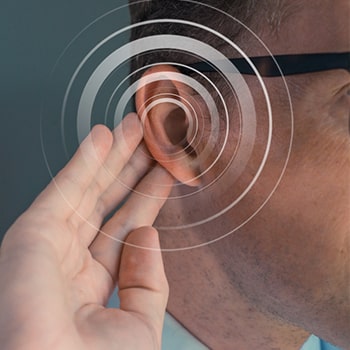
Hearing loss needs to be addressed! Hearing loss can be due to chronic exposure to loud sounds, due to ageing, ear injur, nerve damage, ear infections or excessive earwax. Hearing loss can significantly affect quality of life. Some may be treatable with medication or surgery, while others can benefit significantly with a hearing aid. Those with hearing loss find it difficult to communicate with others, children with hearing loss have delayed or no development of speech and language. Not being able to hear can also be dangerous, for example not being able to hear honking on the street.

The treatment of hearing loss depends on the cause. We also provide certain hearing tests at home (depends on your location). Fix an appointment to know more!
If you suffer from hearing loss, you are not alone. Approximately 17 percent of adults say that they have some degree of hearing loss (source). In older adults, hearing loss is a common condition, affecting about one-third of Adults between the ages of 65 and 74 and nearly half of those 75 and older.
Hearing aids can help some people living with tinnitus, but not everyone. People with normal hearing usually do not benefit from amplification to lessen their perception of tinnitus. Those folks require sound therapy in the form of Tinnitus Retraining Therapy (TRT) to find tinnitus relief.
Some forms of hearing loss can be inherited. Not all inherited forms of hearing loss take place at birth, however; some can show up later in life. For example, otosclerosis, which is thought to be a hereditary disease, disrupts hearing later in life as an abnormal growth of bone prevents structures within the ear from working properly. Typically, hearing loss caused by otosclerosis doesn’t begin until 10 to 30 years of age.
Noise plays a major role in hearing loss. In fact, frequent exposure to loud noises is one of the most common causes of hearing loss, because high-decibel noises can permanently damage the inner ear. It also contributes to tinnitus (a ringing, roaring, clicking, hissing, or buzzing sound in the ears). Some people experience both hearing and tinnitus due to a combination of noise exposure and advanced age. We measure the intensity, or loudness, of a sound in units called decibels (dB). An ordinary conversation with a friend will reach approximately 60 dB, while the noises produced by city traffic can reach up to 85 dB. A firecracker can reach an ear-piercing 150 dB! Noises that reach 85 dB or above can permanently damage the inner ear, leading to hearing loss.
Noise-induced hearing loss is 100 percent preventable. The loudness of a sound and the length of your exposure to it will impact the severity of damage possible. To protect your hearing, avoid noises at or above 85 dB, including lawnmowers, snowblowers, motorcycles, firecrackers, and loud music. Reduce the sound if you can, or wear ear protection if you cannot. For example, lower the volume on personal stereo systems and televisions. When you cannot escape or reduce noise, wear earplugs or other hearing protection devices. If you are a parent, protect your children’s ears as well.
What Our Happy Patients Had To Say !!